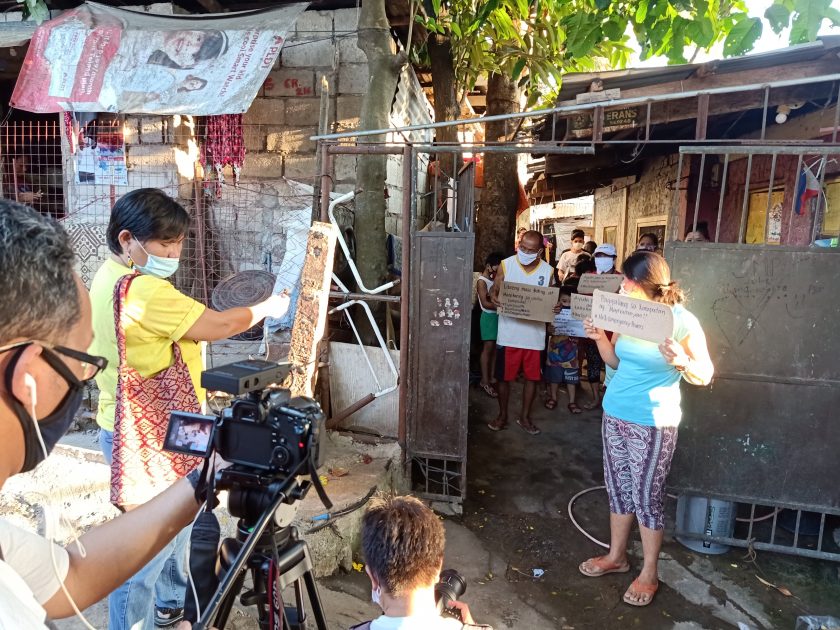“May we point out that the responsibility of the PCOO nor the PIA is government communication and information dissemination, not media accreditation and, certainly, not regulation.”
By ALYSSA MAE CLARIN
Bulatlat.com
 MANILA— The International Federation of Journalists (IFJ), the world’s largest organization for journalists, condemned the discrimination against Bulatlat and called on authorities to respect press freedom.
MANILA— The International Federation of Journalists (IFJ), the world’s largest organization for journalists, condemned the discrimination against Bulatlat and called on authorities to respect press freedom.
Bulatlat and other alternative media outfits have been denied accreditation by the Presidential Communications Operations Office (PCOO). Under the Luzon-wide enhanced community quarantine, the Inter-Agency Task Force for the Management of Emerging Infectious Diseases (IATF-IED) insisted that media outfits need to get special passes from PCOO to be exempted from quarantine protocols.
“Limiting access for journalists in emergency situations will hinder the public’s ability to get factual reports from the field,” said IFJ in a statement.
The group earlier said the new policy was ‘bluntly enforced.’
“Ultimately, this will deprive the media access,” said IFJ. “Open access for the media during emergencies is vital so that they can inform the public.”
While journalists and media groups contested the imposition, the PCOO and IATF stood firm in their decision and pursued for the additional media accreditation.
However, the new guidelines seem to put small media outfits and community journalists outside of Luzon at a disadvantage.
Discrimination
Bulatlat, the longest-running online media outfit in the Philippines, decried the discrimnation of the PCOO and IATF against alternative media outlets applying for accreditation.
Read: Bulatlat denounces PCOO’s media discrimination and repression amid COVID-19 lockdown
Bulatlat sent its application for a PCOO-accredited I.D. on March 17. After two days, the news outfit resent its application but received no reply.
On March 22, the news outfit contacted the International Press Center (IPC) tasked to process all media outfits’ accreditation, and inquired about the application. Tthe representative only told them that IATF had instructed them to limit the number of journalists given special passes, and to ‘prioritize mainstream media’ for the accreditation.
“We cannot help but point out the discrimination against small, non-profit media outfits. Denying us access to areas under quarantine, which is the entire Luzon, is outright censorship reminiscent of Martial Law,” said Bulatlat.
Just like Bulatlat, Kodao Productions also sent their application immediately after IATF’s announcement. The outfit also tried to reach out and follow up their application twice, and called both agencies on March 22 and 27, respectively.
In a phone interview, Kodao Executive Director Jola Mamangun expressed her displeasure at the implementing office’s clear discrimination against the alternative media.
“They told us they had already received 10,000 applications, and that they had to trim down the application,” Mamangun said.
When they inquired how Kodao would be able to operate under the ECQ without the accreditation, the representative answered that they could still roam around using their company issued media I.D. and quarantine passes.
“If our company issued I.D. and quarantine passes are enough, then there’s no need for another I.D.,” stated Mamangun.
When the representative suggested for Kodao to just “hook-up and get information” from accredited online outfits, Mamangun fumed.
“We will still continue to do our jobs, write stories and report from the ground, with or without their added media accreditation,” Mamangun said.
The deadline for application of accreditation with the PCOO was on March 26 and until now, no accreditation was given to alternative news outfits based in Metro Manila
Additional media accreditation is unnecessary for journos outside Luzon
In a recent statement, the National Union of Journalists of the Philippines (NUJP) also slammed Philippine Information Agency (PIA) offices in the provinces who were reportedly asking community journalists in the area to have themselves accredited by the PCOO.
The NUJP said PIA offices were asking their colleagues to submit their names and contact information for the supposed accreditation.
“May we point out that the responsibility of the PCOO nor the PIA is government communication and information dissemination, not media accreditation and, certainly, not regulation,” the group added.
Additionally, some local government units and task forces had also started requiring journalists within their jurisdictions to get accreditation.
NUJP cited a situation in Zamboanga City where local journalists are being required to have an ID issued by the local task force on COVID and another issued by the city government.
“We call on the PCOO and the PIA and local government units to end media accreditation and all other moves that may hamper the swift delivery of accurate information to people in our communities, which is vital in this time of crisis,” the group said.
Media groups have been protesting the implementation of the additional requirement since its announcement, branding it as “unnecessary, unreasonable, and clearly unconstitutional.”
In their joint statement, they said that the guideline violates articles 3 section 4 and 7 of the Philippine constitution’s Bill of Rights.
“For the media to submit to restrictions such as this government would impose through the PCOO accreditation is simply untenable,” said the groups in the statement.
“We demand full respect for freedom of the press and of expression, and an end to accreditation and any attempts to control the media,” they said.
The post Media accreditation for COVID-19 coverage, prior restraint — groups appeared first on Bulatlat.




